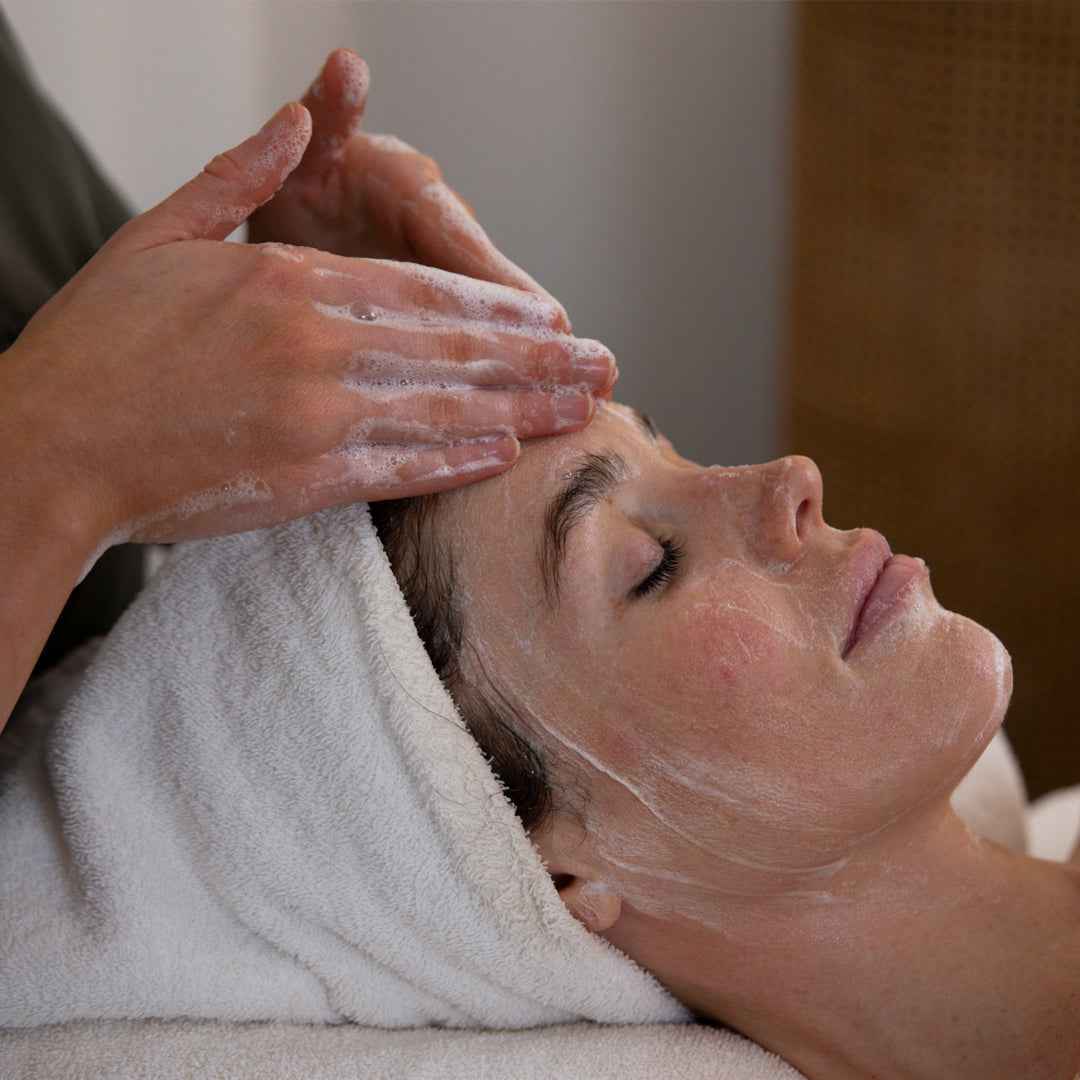Demystifying clinical skincare
Understanding active ingredients for remarkable results.
In our previous guide to choosing the right spa treatment, we touched on the transformative power of clinical skincare treatments. Today, we're going deeper into the world of clinical skincare to help you understand what makes these treatments so effective and how you can make more informed choices about your skin health regimen.

What makes skincare "clinical"?
Clinical skincare represents a more results-driven approach to skin health that bridges the gap between cosmetic products and medical treatments. At Botanica Wellness Spa and Clinic, our clinical approach focuses on three key elements:
-
Higher concentrations of active ingredients that can penetrate deeper into the skin.
-
Scientifically proven formulations backed by research and testing.
-
Professional application and guidance from trained skin specialists.
While over-the-counter products typically contain 0.5-2% of active ingredients, clinical-grade products may contain 5-20% (or more), making them significantly more potent and effective at addressing specific skin concerns.
Key active ingredients: what they do and who should use them
Understanding active ingredients is essential for navigating clinical skincare effectively. Here's our breakdown of the most powerful ingredients in modern skincare science:
Vitamin A Derivatives (Retinoids)
What they do: The gold standard in anti-aging, retinoids accelerate cell turnover, boost collagen production, and regulate oil production.
Best for: Fine lines, wrinkles, uneven skin tone, acne, and overall skin rejuvenation.
How to use: Start with a lower concentration (0.25-0.5%) and gradually increase as your skin builds tolerance. Apply at night, and always use sun protection during the day, as retinoids can increase sun sensitivity.
Alpha Hydroxy Acids (AHAs)
What they do: These water-soluble acids exfoliate the skin's surface by dissolving the bonds between dead skin cells.
Best for: Hyperpigmentation, sun damage, dull skin, and fine lines.
Common types:
-
Glycolic Acid (smallest molecule, penetrates deepest)
-
Lactic Acid (gentler, more hydrating)
-
Mandelic Acid (larger molecule, ideal for sensitive skin)
How to use: Begin with a 5-10% concentration once or twice weekly, gradually increasing frequency as tolerated. Always apply sunscreen during the day.
Beta Hydroxy Acid (BHA)
What they do: Oil-soluble acids that penetrate into pores to clear blockages and reduce inflammation.
Best for: Acne, blackheads, enlarged pores, and oily skin.
Common type: Salicylic Acid (most common BHA)
How to use: Most effective in concentrations of 1-2% for daily use, or up to 9% in professional treatments.
Vitamin C (L-Ascorbic Acid)
What they do: A powerful antioxidant that brightens skin, stimulates collagen production, and protects against environmental damage.
Best for: Brightening, protecting against free radical damage, and boosting collagen.
How to use: Most effective in concentrations of 10-20%. Look for formulations with pH levels below 3.5 for optimal absorption. Store in dark, airtight containers to prevent oxidation.

Peptides
What they do: Small chains of amino acids that act as cellular messengers, instructing the skin to perform specific functions (like producing more collagen).
Best for: Firming, plumping, and addressing fine lines.
Types to look for:
-
Signal peptides (stimulate collagen production)
-
Carrier peptides (deliver trace minerals for healing)
-
Neurotransmitter-inhibiting peptides (temporarily relax facial muscles)
How to use: Most effective when used consistently over time in serums or moisturisers.
Niacinamide (Vitamin B3)
What they do: A versatile ingredient that strengthens the skin barrier, regulates oil production, reduces inflammation, and brightens skin tone.
Best for: Almost everyone! Particularly beneficial for acne-prone, sensitive, or redness-prone skin.
How to use: Effective in concentrations of 2-10%. Higher concentrations may cause irritation in sensitive individuals.
Identifying your skin's needs
Before incorporating active ingredients into your routine, it's crucial to understand your skin's specific needs. Here are some common concerns and the ingredients that address them most effectively:
Aging Skin
-
Primary focus: Retinoids, peptides, vitamin C
-
Supporting ingredients: AHAs, niacinamide, hyaluronic acid
Acne-Prone Skin
-
Primary focus: Salicylic acid (BHA), retinoids
-
Supporting ingredients: Niacinamide, azelaic acid, benzoyl peroxide
Hyperpigmentation
-
Primary focus: Vitamin C, AHAs, retinoids
-
Supporting ingredients: Niacinamide, arbutin, tranexamic acid
Sensitive or reactive Skin
-
Primary focus: Niacinamide, centella asiatica, panthenol
-
Supporting ingredients: Hyaluronic acid, ceramides, lactic acid (in low concentrations)
Dehydrated Skin
-
Primary focus: Hyaluronic acid, glycerin, ceramides
-
Supporting ingredients: Lactic acid, panthenol, polyglutamic acid
Building your clinical skincare routine
A thoughtful, consistent approach yields the best results with clinical skincare. Here's a basic framework:
An example morning routine
-
Gentle cleanser
-
Antioxidant serum (vitamin C)
-
Targeted treatment (based on concerns)
-
Moisturiser
-
Broad-spectrum sunscreen (SPF 30+)
An example evening routine
-
Cleanser (double cleanse if wearing makeup)
-
Exfoliant (AHA/BHA, 2-3 times weekly)
-
Targeted treatment (retinoid or alternative)
-
Niacinamide serum (optional)
-
Moisturiser
Important: When introducing active ingredients, add one new product at a time with at least 1-2 weeks between additions to monitor how your skin responds.

When to seek professional help
While home care is essential, professional treatments can significantly enhance your results. Consider booking a skin consultation at Botanica Skin Clinic if:
-
Your skin concerns persist despite consistent home care
-
You're unsure which ingredients are right for your specific needs
-
You're experiencing sensitivity or adverse reactions
-
You want to accelerate your results with professional-strength treatments
-
You're preparing for a special event and want your skin to look its absolute best
Our clinical skin specialists can provide personalised advice and create a treatment plan that combines at-home care with in-clinic treatments for optimal results.
Avoid these common mistakes
Even with the best ingredients, improper use can limit your results or cause irritation:
-
Using too many actives at once: This can compromise your skin barrier. Start with 1-2 active ingredients and build gradually.
-
Improper layering: Apply products from thinnest to thickest consistency for optimal absorption.
-
Mixing incompatible ingredients: Some ingredients don't work well together:
-
Avoid using retinoids with AHAs/BHAs in the same routine
-
Don't mix vitamin C (L-ascorbic acid) with retinoids or niacinamide in the same application
-
Skipping sunscreen: Many active ingredients increase sun sensitivity. Daily SPF is non-negotiable.
-
Expecting overnight results: Clinical skincare works progressively; most people see significant improvement after 6-12 weeks of consistent use.
The professional advantage: in-clinic treatments
While home care is fundamental, certain transformations are only possible with professional treatments. At Botanica Skin Clinic, we offer several clinical treatments that work synergistically with your home care routine.
Our skin specialists can help you determine which in-clinic treatments will best complement your home care regimen for maximum results.

Take the next step in your skin health journey
Understanding clinical skincare is empowering, but personalised guidance can fast-track your results. Our skin specialists at Botanica Wellness Spa and Clinic are available to analyse your unique skin needs and design a comprehensive approach combining home care with professional treatments.
Ready to transform your skin with a clinical approach? Book a skin consultation with our specialists or call us at (03) 9620 5992 to start your journey toward your healthiest skin yet.
This article is for informational purposes only and does not replace personalised advice from a skincare professional. Individual results may vary. For best results, we recommend consulting with a skin specialist at Botanica Wellness Spa and Clinic before beginning any new skincare regimen.
